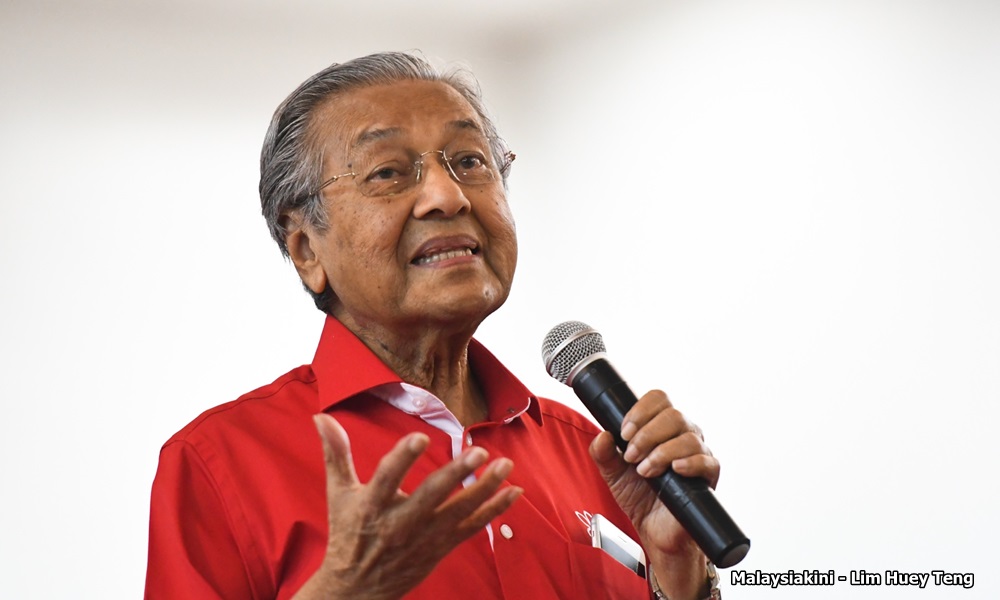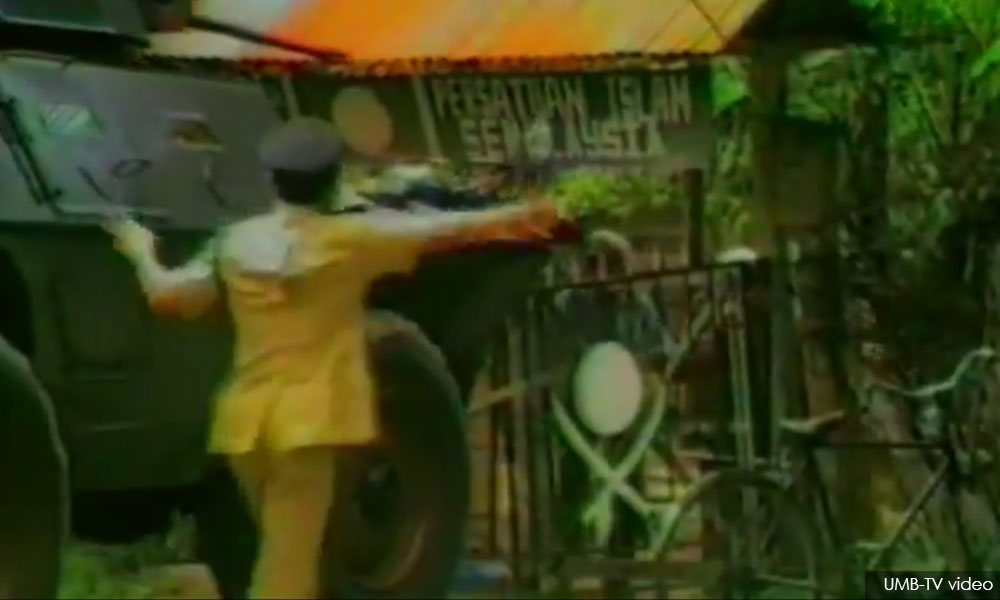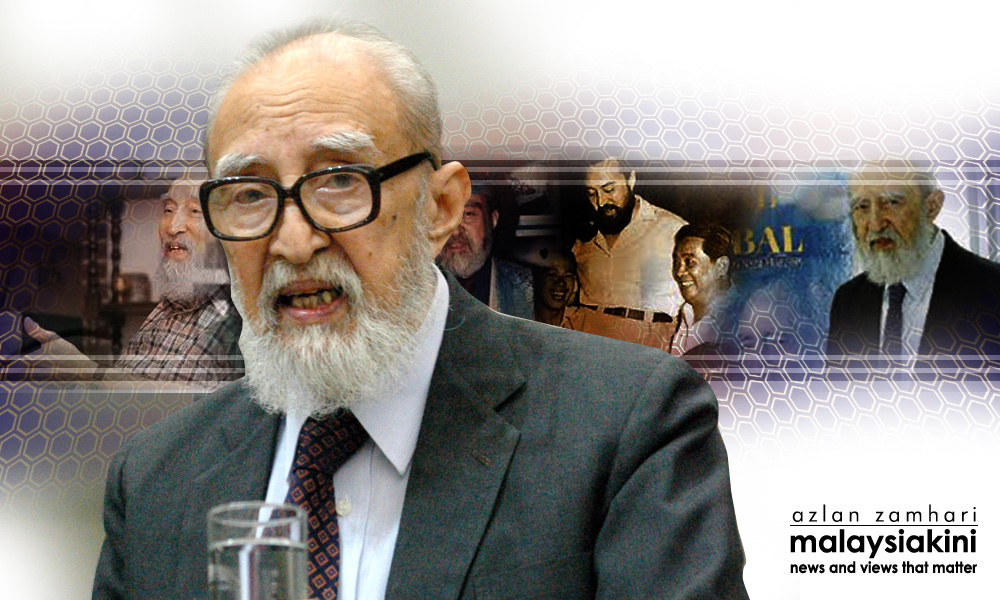
Malaysians with more than a cursory familiarity with the recent history of the country are apt to blame Dr Mahathir Mohamad for how Prime Minister Najib Razak’s administration has turned out.
They contend Malaysia’s fourth prime minister seeded the bed from which emerged the kleptocratic phenomenon of the sixth PM they decry and want the country rid of.
Some among this cohort would like Mahathir to go through the ritual, if not the very substance, of public contrition for having been a Najib-enabler before he assumes to be a Najib-remover.
True, many from this same group are amazed at the energy of a man, who in his 10th decade of life, is willing himself to go through the rigours and exactions of removing an incumbent PM, with all the advantages - to which Mahathir contributed enormously during his long PM-tenancy - accuring to the present holder.
Yet, the same bedazzled crowd want to see some sign of remorse from Mahathir before they find credible the notion of him as extricator of the country from the predicament he is faulted for spawning.
Judging from the outcome yesterday of a dialogue session between Mahathir and a slew of Old Putras - the moniker for alumni of the Royal Military College - held at the Perdana Leadership Foundation (PLF), these doubting Thomases are on a hiding to nothing.
All they will get from Mahathir are laments about his “failure” to change the work ethics of the Malays. Nothing more.
 Apparently, there will be no mea cuplas for what he did to the judiciary, none for the Memali fatalities, or a host of other blemishes on his chequered record, like the
Apparently, there will be no mea cuplas for what he did to the judiciary, none for the Memali fatalities, or a host of other blemishes on his chequered record, like thelegitimisation of the influx of migrants into Sabah.
Ingratitude towards their great leaders is the mark of strong peoples, observed the Roman writer Plutarch.
At yesterday’s dialogue, one would have to be obstreperous or downright discourteous to subject Mahathir to a sharp and unceremonius inquisition of his 22-year track record as Malaysia’s fourth PM.
The ‘budak boys’, another sobriquet for RMC alumni, are loath to be rude.
In the event’s promotionals, the dialogue was billed as a ‘come and ask-tough- questions’ session.
Mahathir is a great leader
It transpired for the slew of Old Putras gathered yesterday, among whom was the redoubtable economist Jomo K Sundaram, that to hold Mahathir to account, or at least to have him say something in explanatory mitigation of his misdeeds, would have been, in the circumstances, bad form.
Mahathir is a great leader; he attempted great things in his long premiership. As Desiderius Erasmus wrote, in great things it is enough to have tried.
As a nonagenarian, he is still striving to do something about the country’s fraught situation, an amazing effort in itself.
Yesterday, while the Old Putras, in an interlude before the dialogue, were mulling the issues they proposed to raise - and wavering between a choice of stiletto questions or anodyne ones - Mahathir was in an upstairs room in the PLF complex.
You guessed it - he was working. The basis for this inference?
Well, shortly after the dialogue ended, this website uploaded a story on Mahathir’s latest posting on his blog, which turned out to be a sardonic broadside aimed at the alleged fondness for extravagant fashion accessories of the first couple.
This portal said the posting was uploaded in the evening, just when Mahathir was about to make an appearance in the PLF anteroom where the Old Putras had assembled for the dialogue with him.
One could say, with Rudyard Kipling, that Mahathir’s work ethic enables him to “fill the unforgiving minute with sixty seconds’ worth of distance run”. He doesn’t waste time.
It was no surprise, then, he told the Old Putras that he admired the Japanese work ethic, which he observed on a 1961 visit to the country.
A leader who chose his role models early
Clearly, this was a leader who chose his role models early in life. As someone raised in Kedah, Mahathir noted in his remarks that “I have lived under Thai, Japanese and British rule.”
In sum, his life has been long and observant, during which he had opportunity to compare and contrast various concepts and practices that constitute his experiential knowledge of his times.
Nothing he said to the Old Putras was particularly salient or especially revelatory.
Essentially, they were variations on his now-familar theme of what had gone wrong with the country from the time he retired in 2003 - and not since the time, as his detractors contend, he was its PM.
The Old Putras who heard Mahathir must have emerged from the session with admiration for the man’s indomitable spirit more than belief in his credibility as a reformer in a post-Najib era.
To be sure, Mahathir was not pressed for answers on the origins of the fraught issues of the day, the topic that was uppermost in the minds of his listeners.
But there was one discrepant note when one attendee credited Mahathir with being a “great intellectual” in the preamble to the question he posed.
A well-read man, Mahathir is familiar with the world of ideas but he is not an intellectual in what is taken to be the meaning of that term: the developer and possessor of a coherent worldview, which one then applies, with imagination and flair, to any subject.
Mahathir is an employer of ideas and concepts he has culled from history and from observed experience. He’s not particularly concerned for their quotient of truth or their place in a hierarchy of values.
He uses ideas as the practical leader he is and dispenses with them when they lose their worth for him. He attitude towards them is entirely utilitarian, not cerebral.
 Nobody who has read ‘Siapa Yang Salah’, the late Professor Syed Hussein Alatas’ 1971 critique of Mahathir’s arguments in the latter’s book, The Malay Dilemma, published a year earlier, will acquiesce to the view that Mahathir is an intellectual.
Nobody who has read ‘Siapa Yang Salah’, the late Professor Syed Hussein Alatas’ 1971 critique of Mahathir’s arguments in the latter’s book, The Malay Dilemma, published a year earlier, will acquiesce to the view that Mahathir is an intellectual.
But if one were to call him an intellectual, he won’t contest it - he didn’t yesterday - though he would not encourage its use with respect to him.
He cares little for labels
The crux of the matter is he cares little for labels: he allows others to describe the packaging as long as it’s he who determines the content.
This pragmatic bent has enabled him to build up Pakatan Harapan, the coalition he now leads, by straddling its components’ different interests and coaxing them to move in a particular direction.
The same pragmatism, and a huge dose of nerve, saw him overcome the currency crisis in 1997, of which spoke a lot yesterday, when he rejected the International Monetary Fund’s prescription of higher interest rates in favour of currency controls.
Nerve is what you need to jump from a four-storey building when there is no other escape from a fire. Courage is when you go back for a friend.
The ‘nerve’ (and pragmatism) with which Mahathir is commonly associated, are the guts to back his own calculation of the odds.
In crisis-ridden instances of his career, his calculation has not just been the right decision, but also was in his - not to mention - the country’s interests.
Those who attended Mahathir’s dialogue with the Old Putras must be hoping his calculation of a Harapan victory in the next general election is the right one.
It’s just that several felt matters should not have come to this tenuous pass, in the first place, which would have been the case had Mahathir been less authoritarian.
But Mahathir is a ‘both/and’ and not ‘either/or’ political persona.
He is, as the lawyer and social activist Haris Ibrahim said, both “destroyer” and “agent of change.”
That’s the only way to understand the man.
TERENCE NETTO has been a journalist for more than four decades. A sobering discovery has been that those who protest the loudest tend to replicate the faults they revile in others. Mkini



No comments:
Post a Comment
Note: Only a member of this blog may post a comment.